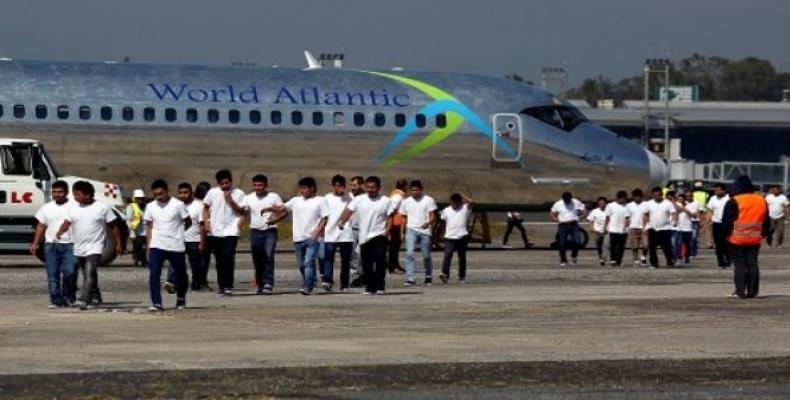Guatemala City, January 18 (RHC)-- More than 2,000 Honduran migrants and asylum seekers entered Guatemala on Thursday as part of the latest caravan to leave for the United States, despite new asylum agreements across the region and vows to stop their advance.
The caravan split into two groups, with one heading to the remote northeast Peten Department in hopes of finding a safer crossing into Mexico. This week, new Guatemalan President Alejandro Giammattei said Mexican officials have stated they would not permit the caravan to cross into Mexico. But migrants told Al Jazeera that some believe the border crossings in Peten will be open and more secure.
Videos shared on Facebook showed streams of migrants walking down the hot, sun-drenched highways in the far north of the country. Other migrants followed the routes taken by previous caravans to the Mexican border town of Tapachula.
Jose Argueta, a migrant from Honduras, arrived in Guatemala City after a truck driver gave him and other migrants and asylum seekers a ride to the country's capital. The 19-year-old, who was born in Comayagua, Honduras but later migrated to San Pedro Sula, said he is fleeing violence and poverty.
"It is very dangerous and there is little work," said Argueta, who is hoping to reach Santa Elena, Peten where many migrants are congregating. Argueta, who worked in a mechanic's shop for roughly $40 a month, helped support his family. "I take care of my mother, father and my five siblings," he said. "But there are times that we have nothing to eat for at least two days."
More than 60 percent of Hondurans continue to suffer from poverty in spite of improvements to the economy, according to the International Development Bank. The country also continues to suffer from extreme forms of gangs and state violence.
"The situation in Honduras has grown worse, and people have made the firm determination to abandon the country due to the violence and extreme poverty," said Father Mauro Verzeletti, the director of Casa del Migrante, a migrant shelter in Guatemala City.
The first major caravan of Honduran asylum seekers set out in October 2018, and quickly grew to thousands of people. In the months that followed, similar caravans set out from both Honduras and El Salvador. But they were met with resistance, including new US immigration policies that have kept many at the US-Mexico border while they wait for their asylum cases to make their way through US courts.
This week's caravan also comes as Hondurans and Salvadorans are being sent back to Guatemala under a controversial agreement between Washington and Guatemala City. On Thursday, flights carrying five Honduran and four Salvadoran asylum seekers arrived in Guatemala City as part of the controversial Asylum Cooperation Agreement. The so-called "safe third country" agreement allows the US to send asylum seekers to Guatemala where they can apply for asylum or be returned to their countries.
Since the agreement was implemented on November 21, 2019, 128 Hondurans and Salvadorans have been sent to Guatemala, according to the Guatemalan Migration Institute. Of those sent, less than 10 have applied for asylum, with the rest choosing to go back to their home countries.
Yet for many seeking to reach the U.S. in the current caravan, the threat of being deported back to Guatemala is better than remaining in their home countries. Immigrant advocates have slammed the deal, saying Guatemala is not equipped to handle large numbers of asylum seekers. Guatemalan President Giammattei initially criticised parts of the cooperation deal, but has since asked for documents to analyse it before stating his full position. Giammattei's office did not respond to Al Jazeera's request for comment.
Meanwhile, Honduras has signed a similar agreement, U.S. officials said last year. Under that deal, which U.S. officials say could be implemented in the coming weeks, asylum seekers from Cuba and Haiti could be sent to Honduras. The program may also be expanded to include asylum seekers from other countries.
Despite the obstacles, immigration advocates expect groups of Central American asylum seekers to continue to stream towards the United States. "The multilateral agreements are not providing people with food or work, " Verzeletti said. "[The agreements] do not resolve the problem in which they live. The agreements do not form new public policies."


